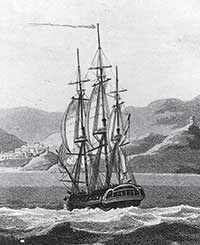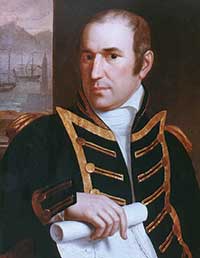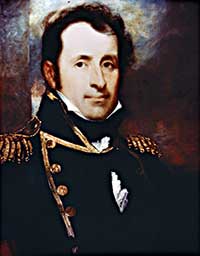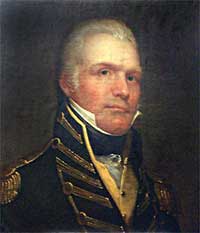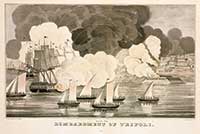Page content
To the Shores of Tripoli
Thomas Jefferson wages America's first war on Terrorism
by Ed Crews
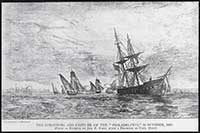
U.S. National Archives and Records Administration
Illustration of the USS Philadelphia's stranding and capture on Oct. 31, 1803.
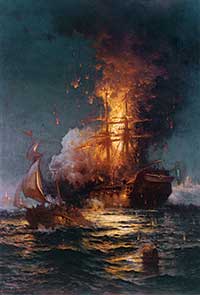
U.S. Naval Academy Museum Collection
The USS Philadelphia, previously captured by the Tripolitans, ablaze after she was boarded by Stephen Decatur and 60 men. After it was set afire they made their escape in the ketch Intrepid, depicted in the foreground.
Lookouts high in the rigging of USS Philadelphia gave a cry on the morning of Oct. 31, 1803 that electrified the ship: A sail. A sail off the port bow.
Sure enough, in the distance, a vessel was racing to Tripoli in an attempt to dash past the 36-gun American frigate blockading the harbor.
For weeks now, Captain William Bainbridge and his 307-man crew had become increasingly bored, watching the North African port. Their uneventful patrols had followed a mind-numbing pattern as they repeatedly crisscrossed the same patch of empty ocean off a never-changing coastline.
Yet, everything changed instantly with the lookouts' call. Excitement was in the air as sailors and Marines ran to battle stations. There was prey to pursue and, perhaps, action, glory and prize money to be had.
The United States had been at war with Tripoli since March 1801 when President Thomas Jefferson ordered a naval squadron to the Mediterranean. Jefferson was fed up with paying tribute for safe waterway passage and furious over Tripoli's seizure of American vessels. So, he took decisive action without Congressional approval. At the time, he'd been in office just 19 days.
The new president's actions had far-reaching effects that can be felt today. Jefferson's orders sent the United States into a war that was its first abroad, its first against terrorism and its first with a Moslem nation.
Unfortunately, Jefferson's bold behavior to throttle Tripolitan piracy was not matched by daring naval leadership. The first American commanders in the Mediterranean showed a stunning lack of initiative, urgency and even sound seamanship, as Bainbridge aboard Philadelphia would demonstrate.
After his men spied the port-bound vessel on Oct. 31, Bainbridge gave chase and did so aggressively. It was a risky decision.
His quarry was a smaller, faster ship. Its captain and crew knew the local waters, which were studded with reefs and shoals. Philadelphia had a much deeper draft. Plus, Bainbridge knew little about the inshore area and had neither a pilot nor reliable charts.
After more than two hours of fruitless pursuit and with a growing concern about water depth, Bainbridge ended the chase and headed for open sea. Minutes later, turning away from the coast, Philadelphia hit a rocky sandbar. The crew piled on sail, cut the mainmast and dumped cannons and anchors overboard. Yet, nothing could free her.
Enemy gunboats soon surrounded the frigate. Unable to escape, a weeping Bainbridge ultimately surrendered one of the United States' newest, fastest and finest warships without offering any resistance. With the captain's capitulation, America's war effort literally and figuratively had hit rock bottom. Not only was the Tripolitan threat undiminished, but it seemed that, perhaps, the situation in the western Mediterranean might remain as it had for 300 years. Since the 15th century, the Barbary States — Algiers, Morocco, Tunis and Tripoli — had run one of history's most successful extortion rackets. The pirates also gained a reputation for limitless greed, double-dealing and brutality. They captured European ships, enslaved crews, tortured them and demanded ransom and tribute.
As ships from the New World sailed North African waters, they too suffered at the pirates' hands. The first recorded seizure of a ship from Britain's North American colonies occurred in 1625. Assaults continued sporadically into the 1700s. They eventually tapered off because Great Britain adopted a carrot-and-stick policy on the Barbary Coast, simultaneously paying tribute and having the Royal Navy patrol the area.
Naturally, British protection for American ships ended with independence. It took little time for the pirates to renew their attacks on United States' merchantmen. The new nation could do little to stop them.
New Hampshire Congressman Pierse Long accurately described the position in 1786 just three years after the Revolution ended. “At present,” he wrote, “we are not in a condition to be at War with any nation, especially one from whom we can expect nothing but hard knocks.” He was referring specifically to Algiers, but the situation was the same with Morocco, Tunis and Tripoli.
No matter how much American leaders might want to change the situation, their options were limited. The country was burdened with debt from the Revolution, which made paying tribute and rebuilding the disbanded navy extremely difficult. Voters, having endured the eight-year struggle for independence, had little appetite for another conflict. Plus, the Articles of Confederation created a weak national government that could not prosecute an aggressive war effectively.
Despite these obstacles, some Americans believed a fight was necessary, justified and inevitable. Among them was Jefferson. For years, he railed about the pirates.
“Our trade to Portugal, Spain and the Mediterranean is annihilated unless we do something decisive,” he wrote in 1784. “Tribute or war is the usual alternative of these pirates. If we yeild (sic) the former, it will require sums which our people will feel. Why not begin a navy then and decide on war? We cannot begin in a better cause or against a weaker foe.”
Jefferson knew firsthand that nothing short of force could change the situation. In 1786, he and John Adams met Abd al-Rahman al-Ajar, a representative of Tripoli, in London to discuss recent demands for money to let American ships sail peacefully in the Mediterranean. The Tripolitan diplomat was uninterested in negotiation. He demanded 30,000 guineas for his nation and another 3,000 for him. Plus, he told the diplomats Tunis would want a similar amount; Morocco and Algiers would expect more. The bill amounted to $1 million or about a tenth of the U.S. budget.
The Tripolitan also rejected any pretense of friendship with the United States. You are infidels, he said. Ergo, we have every right to take your ships, your money and your people.
Slowly, American anger — and strength — began to build. With the adoption of the Constitution in 1789, the nation got a government that could fight a war. When Congress authorized construction of six frigates in 1794, America got a navy.
While ship construction proceeded, the United States bought time. It signed treaties with Algiers, Tripoli and Tunis. However, demands for more money were inevitable.
They came in October 1800 when Tripoli's rapacious and brutal bashaw Yusuf Karamanli, told U.S. counsel James Cathcart that America could pay more or face a war in six months. To underscore the point, Karamanli's corsairs soon seized an American ship, although crew and vessel eventually were released.
Karamanli was not bluffing, and he usually got what he wanted. He took the throne by killing one brother and exiling another. In short, he was shrewd, ambitious and unscrupulous. He also had a large fleet to back up his demands.
Jefferson became president just as Karamanli's deadline was approaching. Rather than wait for Tripoli to strike, the 57-year-old Virginian acted. On his orders, three frigates — Essex, President and Philadelphia — and one schooner, Enterprise, set sail for the Mediterranean in June 1801.
The venture began well. During August, Lt. Andrew Sterett, commanding Enterprise, engaged and defeated the corsair Tripoli off Malta. The audacious young naval officer quickly became a national hero and the inspiration for a successful play in New York.
Unfortunately, Sterett's success did not herald great things. During the next two years, the first two squadrons' commodores — Richard Dale and Richard Morris — basically did nothing. Morris, in fact, was so inept that he was cashiered from the service.
The third American commander, Edward Preble, a Revolutionary War veteran, was made of sterner stuff. A strict disciplinarian and querulous man, Preble also was aggressive, decisive and brave. He arrived at Gibraltar in September 1803. After dispatching Philadelphia to blockade Tripoli, he sailed to Tangiers to deal with Morocco, which had declared war on America and was preparing to seize American merchantmen. Preble massed warships off Morocco in a show of force. This awed the nation's ruler, which led to a peaceful resolution of the situation.
Having dealt with Morocco, Preble began preparing to handle Tripoli. However, his planning came to an abrupt halt on Nov. 24 when he learned of Philadelphia's capture. Although concerned for the American prisoners, Preble was astonished at Bainbridge's performance.
“Would to God,” Preble wrote the Secretary of the Navy, “that the officers and crew… had one and all determined to prefer death to slavery.”
The Tripolitans soon refloated the frigate, towed it into Tripoli harbor and anchored it there under heavy guard. Preble knew that retaking the ship and getting it to sea was impossible. So, he decided to destroy it and deny its use to the enemy. Characteristically, he devised a bold plan.
On Feb. 16, 1804, Lt. Stephen Decatur Jr. with a volunteer crew sailed a captured ketch into port, boarded the frigate and took it in a brief hand-to-hand fight. The raiders set the ship on fire and successfully escaped from the harbor. Decatur, 25, became a hero and was promoted to captain, making him the youngest person to hold that rank in the navy's history. Horatio Nelson, England's greatest admiral, called Decatur's achievement “the most bold and daring act of the age.”
Preble also shelled Tripoli five times, and ships under his command captured three enemy vessels. These actions failed to move Karamanli who was uninterested in ending the conflict. Despite that, however, Preble returned to the United States as a hero.
Determined to bring the war to a decisive conclusion, the United States sent a powerful squadron of 11 ships to the Mediterranean in 1804 under the command of Capt. Samuel Barron.
Barron was not particularly aggressive. However, he did give grudging support to a mission by William Eaton, an American diplomat, to threaten Tripoli with a land force. Eaton wanted to depose Karamanli and place his exiled brother, Hamet, on the throne. Supported by Marine Lieutenant Presley O'Bannon and seven enlisted men, Eaton created a 400-man mercenary army. Then, in an amazing display of grit and leadership, he pushed the force across 500 miles of desert to Derna. There, Eaton's army won a decisive victory, capturing Tripoli's second largest city on April 27, 1805.
Even as Eaton approached Derna, diplomats had begun the delicate process of ending the war. Yusuf Karamanli had grown anxious about its outcome. His treasury was being depleted. His people were restive. An enemy army was loose in his country. And, the U.S. Navy had enough firepower to pound his capital into submission.
So, talks began. They finished in June. Under terms of the treaty ending the war, Karamanli freed the Philadelphia prisoners and dropped demands for tribute. America abandoned Derna and Hamet's claim to the throne. The republic also paid the tyrant $60,000, a face saving gesture well below Karamanli's initial demand for $200,000. The payment proved extremely controversial in the United States. Still, the Senate approved the treaty in 1806.
For a while, America's problems with the pirates seemed finished. But, they weren't.
Growing tensions with Great Britain caused the withdrawal of American warships from the Mediterranean to home waters. In short order, the two countries were embroiled in the War of 1812. The Barbary pirates took full advantage of the situation, and American ships again were at risk.
When the war with England ended, President James Madison asked Congress for a declaration of war against Algiers, the most powerful Barbary state, and got it in March 1815. The fiery Decatur was given command of a 10-ship fleet and sent to North Africa. He went right to work, capturing Algerian ships and boldly sailing into Algiers harbor with his entire squadron. Decatur subsequently negotiated a treaty that freed prisoners, ended tribute and guaranteed American vessels freedom of movement in the Mediterranean. For good measure, he also sailed to Tripoli and Tunis, demanding the release of prisoners and payment for captured ships. Decatur's exploits spurred European powers to act against the pirates, although it would take almost 20 years to bring the Barbary nations completely to heel.
Two hundred years after America went to war with the Barbary pirates, historians still debate the war's larger significance. Some argue that the 1801-05 conflict achieved little, especially as it took Decatur's 1815 expedition to get decisive results. Plus, the fighting actually cost more than tribute would have.
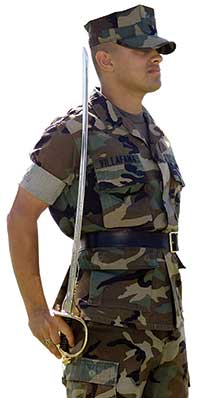
U.S. National Archives and Records Administration
Marines still proudly bear the Mameluke sword, given to Lt. O'Bannon in honor of his 1805 victory at Tripoli.
Consensus opinion, however, says that the first Barbary War — as well as the second — did produce several significant outcomes. The first war established a standing American navy as well as high professional standards for its officers thanks to Preble and Decatur. The war helped shaped the navy's and the U.S. Marine Corps' identities. In fact, “The Marines' Hymn” still honors Eaton's achievements at Derna when it refers to “the shores of Tripoli.” Plus, Marine officers still carry a Mameluke dress sword patterned on one given Lt. O'Bannon by Hamet Karamanli.
Abroad, the war gave America credibility as a military power. Decatur further strengthened this impression with his success against Algiers in 1815.
The war also forced the United States onto the world stage. It demonstrated the nation's readiness and ability to defend itself in military operations hundreds of miles from home. The conflict also showed that American foreign policy was not bound by European precedents. This ensured that the new nation in the future would follow its own path, pursue its own interests and achieve its own goals in international affairs.
Finally, the war played a key role in shaping the young republic's self image as a rising power. The conflict also provided the United States with a buoyant self confidence as well as a sense of mission and destiny. As one contemporary exultant writer put it, the Americans had showed themselves to be “a race of beings! of equal spirit to the first of nations.”

